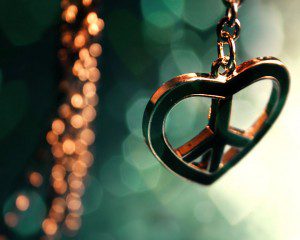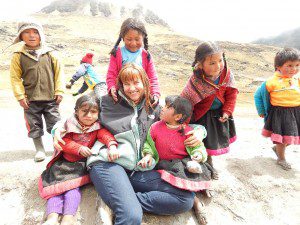Guest Writer for Wake Up World
I just returned from two weeks in Peru, where my friend Dennis and I trekked up to 16,000 feet in the Andes and stayed in a small village with the people of the Q’eros as part of my research for an upcoming book, Sacred Medicine. What I gleaned from the trip was not what I expected. I didn’t come home with a “10 Things I Learned From the Shamans of Peru” list, though perhaps that will come in time. What I gained was something far more profound and much more difficult to translate into words.
I found it almost laughably ironic that I am about to teach a free teleclass with my friend and mentor, Martha Beck, called “An Invitation To Peace”. (Register here to receive a copy of the recording.) This idea was born of a conversation between Martha and I, when we were sensing the busyness and frenetic energy of modern life, noting the social isolation, reading the collective feelings of disconnection, anxiety and depression that plague our culture, and dreaming of a mass awakening of consciousness and infusion of healing peace.
Martha and I could sense that, on some other plane, in some cosmic dimension, this collective peace had already been achieved, and we wanted to help people remember what already belongs to us – the peace we can experience when we return to the true home of our spiritual essence. This was our intention, and when Martha and I felt the meditative peace we wanted to create on this teleclass, we both dropped into a sort of trance that felt very deep and connected and effortless and yummy.
[pro_ad_display_adzone id=”110028″]
And then I went to visit Q’eros, and I recognized instantly that the sense of peace Martha and I were dreaming into being is already right there in this village in the Andes. I could feel it the minute I stepped off the horse that deposited me into the center of the quiet village. What was it I was sensing? Where did this vibration of pure peace originate from? And why did it feel simultaneously so familiar and so foreign? What could we learn from them, and how could we implement it in a way that might bring this kind of peace to the people of our culture?
I just kept thinking of the movie When Harry Met Sally, when filmmaker Rob Reiner’s mother looks at Sally having a fake orgasm in the restaurant and says, “I’ll have what she’s having”. Whatever these people of the Q’eros were having, I wanted more . . .
What Robs Us of Peace?
I found myself musing about what takes us away from our natural state of peace. Surely, peace is how we’re meant to live. It’s not supposed to be something we only access during our daily twenty minutes of meditation. It’s meant to be a steady state of stillness, ease, intimacy with others, alignment with our Inner Pilot Light, and spiritual connection with Nature and the Divine. And yet, why is inner (and outer) peace so rare in our culture? What robs us of this peace?
Is it our busyness? Is it our constant quest for more and more stimulation? More realization of our many burning desires? More possessions, fame, power, money, sex, love, adventure, fun and ambition? Is it our attachment to getting what we want and avoiding what we don’t want? If so, how might we change our world-view so that our constant striving for what we desire and resistance to what we fear doesn’t rob us of our natural peace?
Maybe it’s not our striving and resistance that separates us from peace. Maybe it’s a mental health issue. When I asked the Q’eros people if anyone in their village struggled with depression or anxiety, they didn’t quite understand what I was asking. So I gave them an example.
How Loss Can Separate Us From Peace
While I was there, a woman went into labor. I’m trained as an OB/GYN so I asked if I could help her, but they told me Q’eros women don’t even get assistance from a midwife. They deliver their own babies, by themselves, in their huts. I said I understood.
The next morning, I heard the sad news that the baby was stillborn. So I asked them — what about this woman? She just tragically lost her baby. Might she get depressed? They still looked confused. No, they said. The community will hold a ceremony for her. She will have the opportunity to cry and grieve. She will be held by those who love her. She will not have to bear her loss alone. Stillbirths happen. They just accept such things. Loss is inevitable. It’s part of life.
I told them that in the US, when someone loses a child, they often get so depressed that they become suicidal. They didn’t understand such a word. What was suicide? So I explained. They said nobody in Q’eros had every killed themselves. But they knew of another woman — a Q’eros woman who left the village and moved into the slums of Cusco. In the ghetto, she had no village. She had no money. Her children had nothing to eat. She lost her sense of purpose. She became very sad and lonely, and one day, they found her dead, surrounded by her children. She had killed herself.
What Causes Depression & Anxiety?
It got me thinking. Have we created a culture that feeds mental illness? Medical school teaches us that depression is a chemical imbalance, a deficiency of serotonin, something to be treated with drugs. But if this is the case, why don’t the people of Q’eros experience it at the same high rate Americans do? Is our culture at least partially responsible for the prevalence of depression and anxiety in our people?
Perhaps we get seduced by the material comforts of modern society. Surely, we have much the Q’eros don’t — electricity, hot water, flushing toilets, iPhones, computers, mattresses, big houses, a vast variety of foods we don’t have to grow ourselves, access to modern medicine that might have saved that stillborn baby.
And yet, while they lack much of what we have, these high vibrational light beings radiate a joy I can’t explain. They have much less yet they seem much happier than we are. The children spent one whole ebulliently joyful day just flying kites they made out of plastic bags and pieces of found wood. Joy is right at their fingertips all the time, even in the face of the kind of loss and uncertainty that might leave us reeling. They seem to lean on each other when tragedies occur, call upon Pachamama (Mother Earth) and the apus (the mountains), heal their hearts, and return to a state of joy much more quickly than we do.
A Return to Peace
I’m not trying to romanticize a culture that is filled with harsh reality. I’m not suggesting we all move up to 16,000 feet in the Andes and live in tiny stone huts heated by fires with no ventilation. I’m not implying that we should completely ditch modern medicine in lieu of shamanic kinds of spiritual healing or plant medicines. And I’m certainly not dismissing the pain that comes with losing a baby or dealing with depression, anxiety, or suicidal thoughts.
But the Q’eros shamans tell me that it’s possible to dream into being a new way of living in the world; where peace is our steady state and we can inhabit it anytime, even if our worlds are falling apart.
As I wrote about here, I’m in the middle of a divorce right now, so it’s tempting to allow myself to get hooked into my own resistance to what is. Yet peace doesn’t live in resistance; it inhabits a state of acceptance of what is, even if what’s happening isn’t what you want. I keep having to remind myself that peace is right there, mine to experience, every minute of every day. The only thing that keeps me from peace is my own resistance to the present moment. When I live right here, right now, as the Q’eros do, peace is always there with me — and it’s there with you too.
What I experienced in my time with the Q’eros was a break from modern culture, where we tend to seek comfort at all costs, avoid discomfort at any price, and resist what is if it’s not what we desire. What I found in the space between this worldview was an experience of peace far greater than I could have imagined. In modern culture, I sense that we have lost something precious — that sense of connection to something Greater Than Ourselves, a feeling of belonging, a shared purpose that moves beyond survival and into the sheer celebration of life.
I believe we can reclaim this. It’s not too late . . .
If you want to join those of us committed to bringing peace back to modern culture, please bring your intention and your presence to the free teleclass Martha and I are conducting — An Invitation To Peace. Register here and please invite anyone who shares this intention with the rest of us.
Together, we can dream this into being. I know it’s possible . . .
Love,
Previous articles by Lissa Rankin:
- Are You Involved With a Narcissist?
- The Initiated Healer
- 9 Practical Tips to Help You Find Your Calling
- 5 Ways Your Healer Could Harm You (Without Ever Meaning To)
- Are You Committed To Your Soul’s Integrity?
- Will You Practice Judgment Or Compassion?
- 10 Health Habits They Don’t Teach in Medical School
- 10 Fun Ways to Reduce Your Cortisol Levels
- 6 Stories To Make You Believe In The Power Of The Mind To Heal You
- 6 More Stories To Make You Believe In The Power Of The Mind To Heal You
- A Radical Way To Grow Spiritually In A Relationship
- The Health Benefits Of Finding Your Tribe
- 7 Tips For Finding Your Tribe
- 10 Surprising Things That Trigger “Fight-Or-Flight”
- Outrageous Openness – Letting The Divine Take The Lead
About the author:
 Dr. Lissa Rankin, MD is a mind-body medicine physician, founder of the Whole Health Medicine Institute training program for physicians and health care providers, and the New York Times bestselling author of Mind Over Medicine: Scientific Proof That You Can Heal Yourself. She is on a grass roots mission to heal health care, while empowering you to heal yourself.
Dr. Lissa Rankin, MD is a mind-body medicine physician, founder of the Whole Health Medicine Institute training program for physicians and health care providers, and the New York Times bestselling author of Mind Over Medicine: Scientific Proof That You Can Heal Yourself. She is on a grass roots mission to heal health care, while empowering you to heal yourself.
Lissa blogs at LissaRankin.com and also created two online communities – HealHealthCareNow.com and OwningPink.com. She is also the author of two other books, a speaker, a professional artist, an amateur ski bum, and an avid hiker. Lissa lives in the San Francisco Bay area with her husband and daughter.
Connect with Lissa on Facebook and Twitter, or visit LissaRankin.com
[pro_ad_display_adzone id=”110027″]









